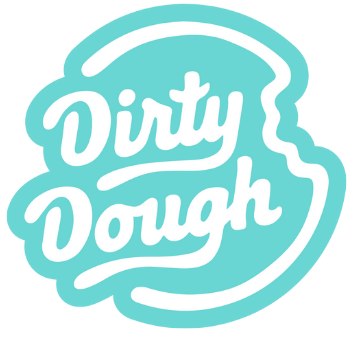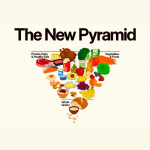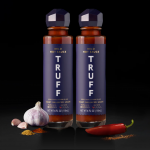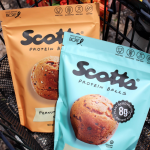Crumbl Sees Rise in DTC Rankings Amid “Utah Cookie Wars”
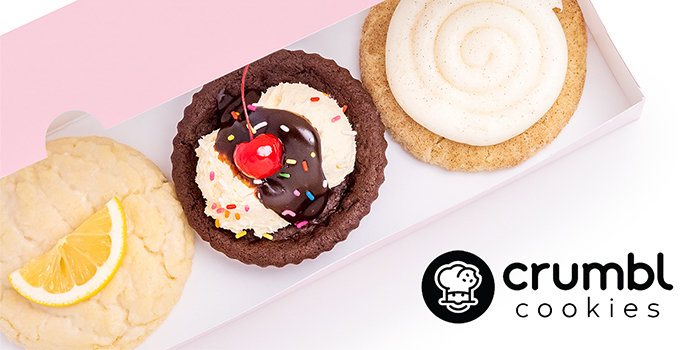
Amid what has been dubbed the “Utah Cookie Wars,” specialty cookie brand Crumbl has experienced growth in its direct-to-consumer sales. According to data from media company 2pm, Crumbl ranked 19 out of 700 DTC companies with an estimated revenue of $125,560,000 the week of August 29. It had previously been a top 15 retailer two weeks prior.
Founded in 2017 by Jason McGowan and Sawyer Hemsley, the Logan, Utah-based company sells a weekly rotating selection of cookies online and at their franchise locations. The cookie company currently has over 570 retail locations in over 45 states. In addition to in-store sales, the company sells cookies via “delivery,” direct from a franchise location using DoorDash, and via “shipping,” from a central bakery and warehouse in Orem, Utah using FedEx.
Although DTC cookie brands are not necessarily a new concept, they experienced significant growth during the pandemic; from 2019 to 2020, DTC sales grew 45.5%, according to Insider Intelligence. DTC strategist Kendall Dickieson told NOSH via email that DTC cookie brands have grown in popularity because, “you don’t have to worry about traveling to a specific city when you can get the experience right to your door” and customers don’t have to worry about making a trip only to find their favorite flavor sold out
One brand that has become something of a social media sensation is Last Crumb, which has become, for many consumers, the voice and face of meme-worthy gourmet – and expensive – cookie delivery. Last Crumb operates on a fashion industry-like “drop” system, constantly building hype and selling out of shipments to build hype for its $140 boxes, with orders shipped from one central Los Angeles-based bakery.
Crumbl and its Tempe, Arizona-based competitor, Dirty Dough (which has stores in Utah), are using a hybrid brick-and-mortar and combined shipping and local delivery model that is also utilized by Insomnia Cookies. The brands also compete with brick-and-mortar specialty cookie company Crave Cookies. The three brands have recently become entangled in a fight over trademark and trade dress infringement claims.
What’s behind Crumbl’s recent D2C growth?
Since its inception in 2017, Crumbl has utilized social media to propel its growth. According to McGowan, the brand’s rotating menu “caters to the social media sphere,” mimicking the posting schedule of online creators.
The brand, which now boasts over 5 million followers on Instagram, told NOSH that it develops its cookies and weekly lineups with taste, cost, process and “Insta-worthy” visual appeal considerations in mind.
“We try to showcase our gourmet cookies like they are the star of the show when we drop the weekly lineups – videos feature cookie breaks, ingredients and fresh lighting,” said McGowan.
Crumbl offers a 6-pack and 12-pack box of gourmet cookies that retail for $29.99 and $49.44, respectively. Some of the featured rotating flavors include Chocolate Sprinkle, Molten Lava, Snickerdoodle, Monster and Milk Chocolate Chip. Every Crumbl location also follows the same cookie rotation.
Despite its recent online growth, Crumbl said that a majority of its business still comes from delivery orders on the local level, directly from franchise locations. According to its website, nearly all franchise locations work with Doordash for deliveries.
McGowan said many customers utilize Crumbl’s delivery services for gifting occasions.
When asked how its strategy differed from its competitors, Crumbl told NOSH the brand had what it believed is four key differentiators: a weekly rotating menu, the “instantly recognizable” pink box, its technology platform and the quality of its products. In May, Crumbl filed lawsuits against two of its competitors, alleging that they had copied its processes, trademarks and trade dress that make it unique.
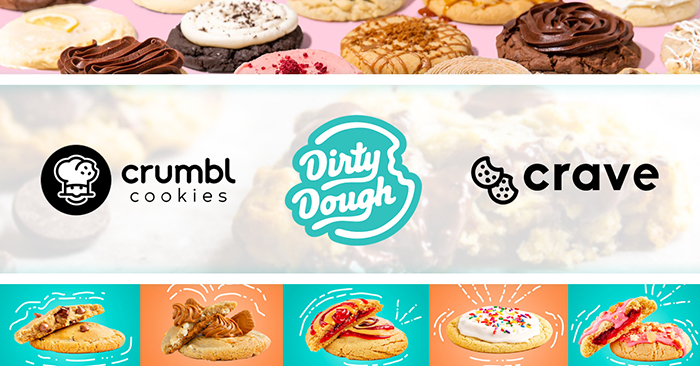
What are the “Utah Cookie Wars”?
On July 21, Hemsley first announced on LinkedIn that the company had filed lawsuits against competitors Dirty Dough and Crave Cookies. In the post, Hemsley alleged both defendants had “unique ties” to Crumbl and formed businesses copying its processes, trademarks and trade dress. And so began the “Utah Cookie Wars,” as local media have begun to call it – or #utahcookiewars, as you might have seen it on Twitter.
Crave has four storefronts in Utah. In its lawsuit, Crumbl alleges the company’s co-founders began producing copycat cookies after their application to become a Crumbl franchisee was denied in November 2019. Crumbl claims that the competitor used “packaging, decor and presentation that is substantially and confusingly similar to Crumbl’s established and successful trade dress and brand identity.”
In the second lawsuit, Crumbl claimed that an unnamed company “insider” left the company in 2019 to found Dirty Dough. In the original LinkedIn post, Hemsley said one of the defendant’s brothers was a former Crumbl corporate employee who had access to the company’s recipes, schematics and processes.
In response to the lawsuit, Dirty Dough put up billboards in Utah with phrases such as, “Cookies So Good We’re Being Sued” and “Our Cookies Don’t Crumble with Competition.” Bennett Maxwell, the company’s founder, later followed up with a statement that despite the lightheadedness on social media, Dirty Dough is “taking the current Utah lawsuits seriously.”
In an update posted to LinkedIn on Tuesday, Hemsley announced that Dirty Dough had allegedly stolen 66 Crumbl recipes, building schematics, processes, store-level statistics, a cookie calendar, training videos and other proprietary information.”
“Dirty Dough wants the public to believe this lawsuit is about stifling competition; this is really about Dirty Dough conducting business in an unethical manner,” Hemsley said in the post.
Crumbl is seeking injunction and monetary compensation from both competitors.
Dirty Dough also took to social media to provide an update on the lawsuit. In an LinkedIn post shared on Tuesday, the company said, “The original lawsuit focused on sprinkles, swirls and whimsical designs and box shapes. Now Crumbl created a stir about allegedly stolen documents provided by a former employee of Dirty Dough.”
The brand added, “Dirty Dough categorically denies stealing any documents from Crumbl. Dirty Dough’s recipes, building schematics and processes are not similar and are clearly different in the public eye.


